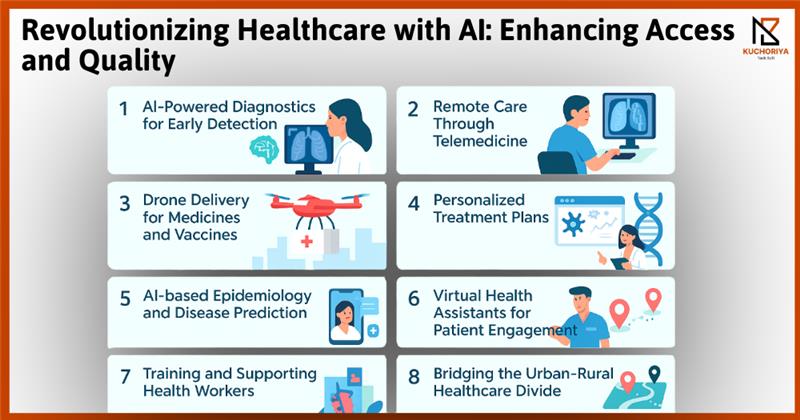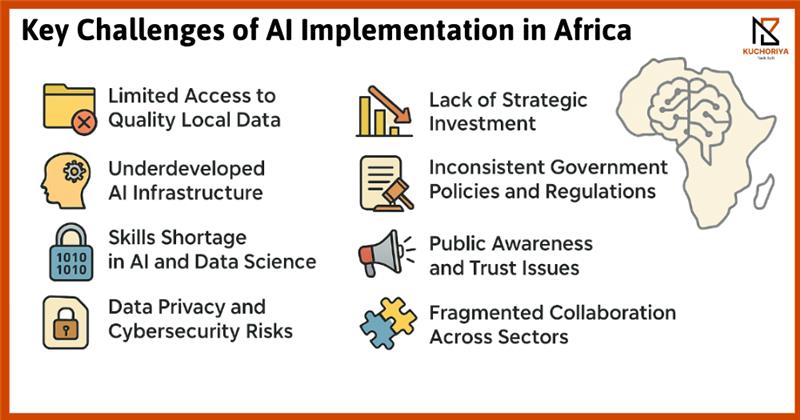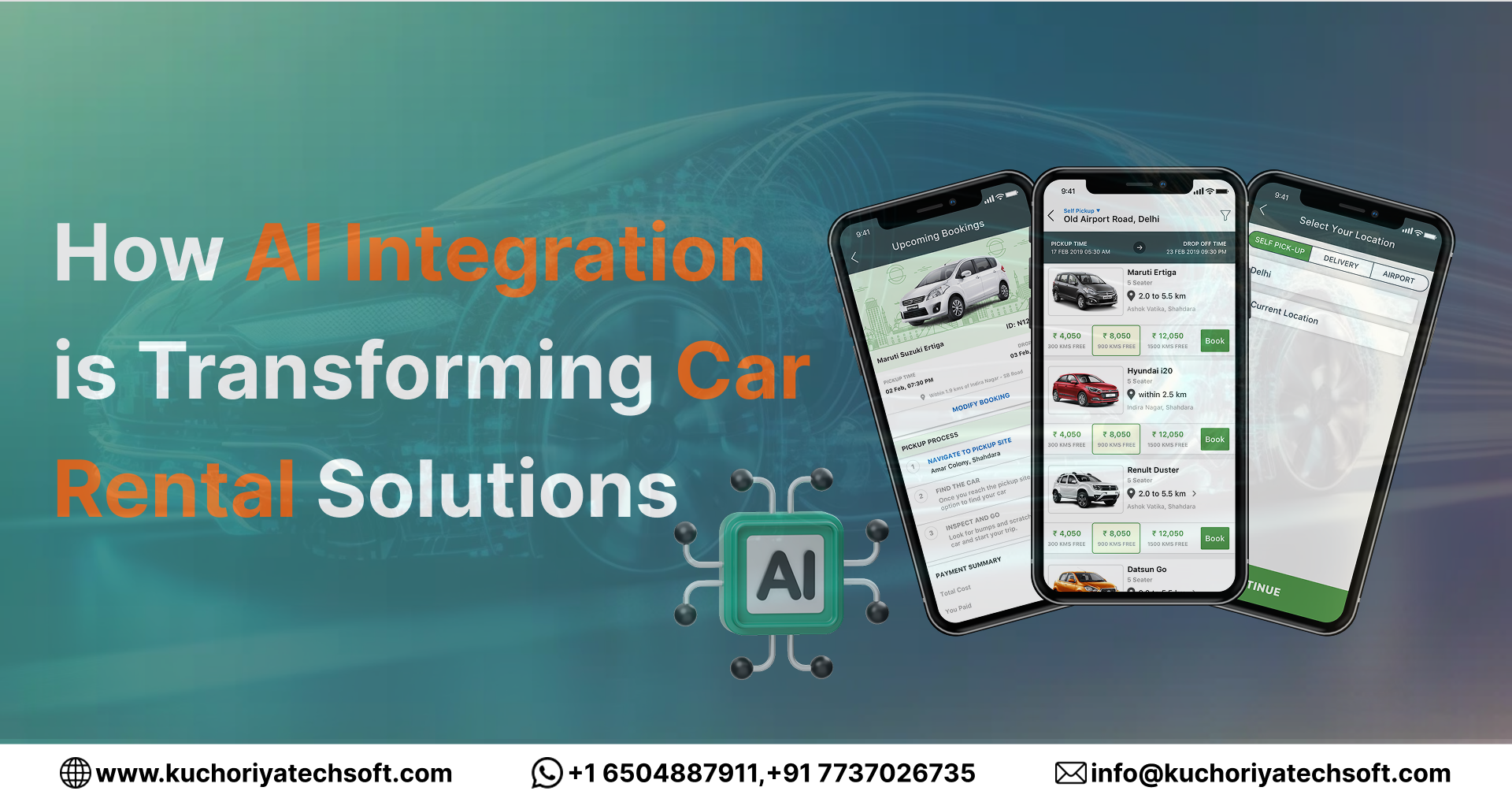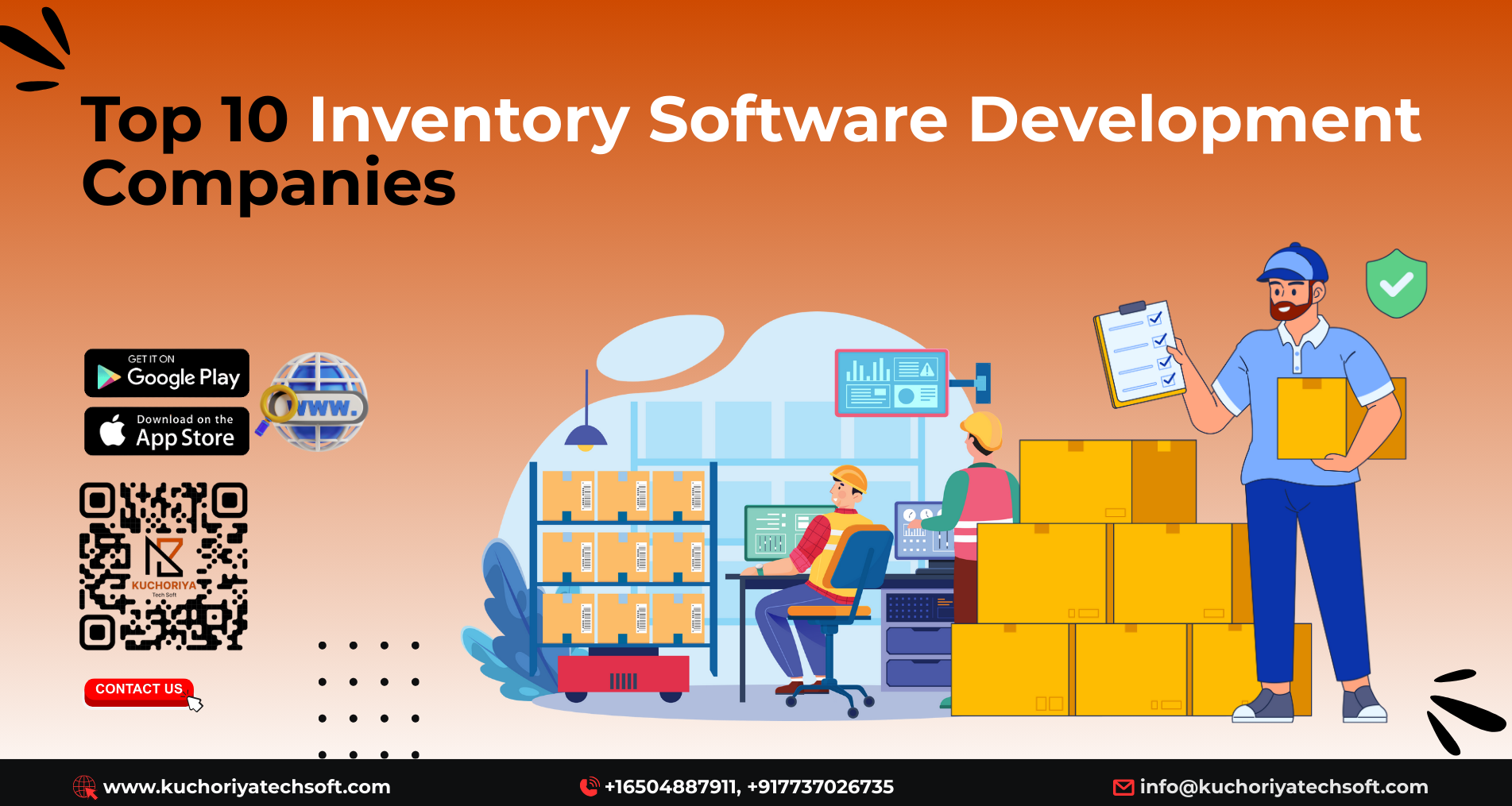AI-Driven Transformation in Africa: Boosting Finance, Healthcare & Agriculture
Artificial Intelligence (AI) and Machine Learning (ML) are accelerating Africa’s digital transformation, opening new doors for innovation and inclusive growth. From financial systems to farms and clinics, AI transformation in Africa is empowering industries to leap over legacy challenges and adopt smarter, scalable solutions.
In the healthcare industry, AI (Artificial Intelligence) is making diagnostics faster, care more accessible, and treatment more personalized. The benefits of AI in healthcare extend beyond efficiency, they are saving lives and improving outcomes across communities. With growing investments in AI solutions in healthcare, along with the rise of AI in finance and AI in agriculture, the continent is entering a new era of smart development.
At Kuchoriya Techsoft, we are proud to be part of this journey. As a technology partner driving Artificial Intelligence in Africa, we deliver tailored AI solutions that support innovation across sectors. This blog highlights how AI in the healthcare industry, finance, and agriculture is reshaping Africa and how Kuchoriya Techsoft is contributing to this transformation.
The financial sector in Africa is undergoing a major transformation, fueled by the power of Artificial Intelligence (AI) and Machine Learning (ML). With a large portion of the population still unbanked or underbanked, AI applications are helping bridge the gap between technology and accessibility, paving the way for Africa’s digital transformation.
Here’s how AI and ML are unlocking inclusive financial growth:
1. AI-Powered Credit Scoring Models
Traditional credit scoring systems often exclude those without formal financial histories. AI and ML technologies are changing this by analyzing alternative data sources, such as mobile money usage, utility payments, and even social media behavior to develop more accurate and inclusive credit scoring models. This opens up credit access to millions across Africa.
2. Personalized Banking with Predictive Analytics
AI enables banks to deliver personalized financial experiences. By predicting user behavior and financial needs, institutions can tailor services for individuals and small businesses, increasing customer satisfaction and driving engagement.
3. AI in Digital Banking Platforms
The rise of digital banking in Africa has been boosted by AI technology such as chatbots, virtual assistants, and smart transaction systems. These tools are expanding access in rural areas, ensuring real-time support, simplified account management, and financial literacy, all through mobile platforms.
4. Fraud Detection & Real-Time Risk Monitoring
One of the most powerful AI trends in finance is its use in fraud prevention. By analyzing massive volumes of transaction data, AI systems detect suspicious activities, alerting institutions instantly to reduce losses and ensure secure banking for all users.
5. Smart Investment and Portfolio Management
AI-powered robo-advisors are offering users access to smart investment tools, even with small amounts of capital. These systems help optimize portfolios based on risk tolerance, market trends, and personal goals, making financial growth more attainable for everyday Africans.
6. Blockchain and AI Integration for Trustworthy Transactions
Combining AI with blockchain increases transparency, reduces fraud, and boosts confidence in financial systems. AI can analyze blockchain activity in real time, helping detect anomalies and secure transactions, which is especially impactful in regions where trust in financial institutions remains low.
7. Financial Inclusion Through Mobile AI Solutions
Mobile-based AI apps are giving millions of Africans access to banking services without the need for physical infrastructure. These innovations are democratizing access to payments, loans, savings, and insurance, driving grassroots-level financial empowerment.
8. Cross-Sector Impact: Laying the Foundation for Healthcare AI
The success of AI in finance is also influencing the adoption of AI in healthcare. Secure payment platforms, predictive analytics, and identity verification technologies used in banking are now being adapted for AI applications in healthcare, enabling secure patient records, appointment automation, and AI-powered diagnostics. These advancements demonstrate the future of AI in healthcare is deeply connected to its evolution in finance.
Check Out Here: Africa Tech Festival 2024: Kuchoriya Techsoft’s Innovations for a Digital Future in Africa

Artificial Intelligence in healthcare is changing the game for African nations by bridging long-standing gaps in medical access, diagnosis, and treatment. As many regions continue to face a shortage of medical professionals, outdated infrastructure, and limited resources, the AI revolution in healthcare is stepping in to bring smart, scalable, and life-saving solutions to the forefront.
Here’s how AI is transforming healthcare across Africa:
1. AI-Powered Diagnostics for Early Detection
Advanced AI algorithms trained on medical data and imaging are enabling faster, more accurate diagnoses of conditions like cancer, malaria, and tuberculosis. These technologies empower healthcare providers to catch diseases early even in areas with few specialists offering patients a better chance at recovery.
2. Remote Care Through Telemedicine
One of the most impactful healthcare innovations with AI is in telehealth. AI-enabled virtual consultations, automated symptom checkers, and remote monitoring tools are allowing patients in rural areas to access care without traveling miles to the nearest facility.
3. Drone Delivery for Medicines and Vaccines
AI-integrated drone technology is revolutionizing supply chains by delivering essential medical supplies to hard-to-reach communities. These drones calculate optimized routes using AI, ensuring speed and efficiency in life-critical situations especially during emergencies or outbreaks.
4. Personalized Treatment Plans
AI systems can analyze a patient’s health history, lifestyle, and genetics to create individualized care plans. In places where specialized doctors are scarce, AI in healthcare ensures that even basic clinics can offer advanced, tailored treatment solutions for chronic and acute conditions.
5. AI-based Epidemiology and Disease Prediction
By analyzing environmental data, mobility patterns, and past outbreak statistics, AI models can help predict disease outbreaks before they occur. This allows public health officials to intervene early, allocate resources wisely, and prevent the spread of deadly illnesses like Ebola and cholera.
6. Virtual Health Assistants for Patient Engagement
AI chatbots and virtual assistants are helping patients book appointments, understand prescriptions, and track treatment schedules, all through mobile phones. These tools reduce the workload on healthcare staff and improve the patient experience.
7. Training and Supporting Health Workers
Through AI-based platforms, frontline healthcare workers in Africa are receiving real-time support and decision-making guidance. AI apps can provide treatment protocols or diagnostic suggestions on the spot, especially helpful in clinics with limited staffing or expertise.
8. Bridging the Urban-Rural Healthcare Divide
Most importantly, AI transforming healthcare means reducing inequality. Whether through mobile diagnostics, AI-driven community health programs, or digital medical records, Artificial Intelligence in healthcare ensures that everyone from city dwellers to remote villagers can benefit from quality care.
Agriculture remains a cornerstone of the African economy, providing livelihoods for millions and supporting national GDPs across the continent. Yet, smallholder farmers continue to struggle with low productivity, unpredictable weather, and limited access to modern technology. Today, AI-powered solutions in Africa are rewriting this story, offering smarter, more sustainable ways to grow, manage, and distribute food.
Here are eight ways Artificial Intelligence is transforming agriculture and fueling broader economic development:
1. Precision Farming for Smarter Yields
AI-driven systems are making precision agriculture accessible to smallholder farmers. By combining data from sensors, drones, and satellite imagery, farmers can monitor soil health, track crop development, and apply resources more efficiently. This tech approach is boosting yields and maximizing land use, critical in areas where farmland is limited.
2. Advanced Weather Forecasting and Planning
Weather unpredictability can make or break a growing season. Through machine learning, AI models now deliver highly accurate weather forecasts based on historical data and real-time monitoring. This allows farmers to prepare for droughts, floods, or shifting seasons, minimizing losses and improving harvest planning.
3. Soil Health Monitoring
AI-powered solutions in Africa are now enabling farmers to test and monitor soil health using mobile devices and IoT tools. These AI tools analyze pH levels, nutrients, and moisture, offering recommendations for optimal crop selection and fertilization, improving productivity while promoting sustainable land use.
4. Automation of Farm Machinery
From planting to harvesting, AI-driven machinery is automating routine agricultural tasks. Equipped with smart vision and GPS, autonomous tractors and harvesters reduce the need for manual labor, helping small farms scale operations efficiently especially in rural regions with limited workforce availability.
5. Smart Pest and Disease Detection
AI-based image recognition tools can now identify crop diseases and pest infestations early, simply by scanning leaves or plants with a smartphone. Early detection helps farmers act fast, saving crops from damage and reducing reliance on chemical pesticides.
6. AI-Optimized Agricultural Supply Chains
AI is streamlining Africa’s agricultural supply chain by improving logistics, reducing waste, and ensuring fair prices. From tracking produce movement to predicting demand, these tools enhance the flow from farm to market, boosting access to fresh food and supporting economic equity for farmers.
7. Integration with Fintech for Agricultural Lending
The intersection of fintech in Africa and agriculture is creating new financial opportunities for farmers. AI-powered credit scoring, crop insurance, and microloans are helping farmers secure funding without traditional banking infrastructure. These innovations are critical to advancing rural economies and increasing resilience against climate-related losses.
8. Driving Economic Impact Across the Continent
The role of AI in African agriculture extends far beyond farms, it’s contributing directly to food security, rural employment, and economic stability. As agriculture modernizes through AI, the impact of AI on the African economy becomes even more evident. From improved trade to better livelihoods, the benefits of AI in Africa’s economy are far-reaching and transformative.

While Artificial Intelligence offers transformative opportunities across finance, healthcare, and agriculture, the path to effective AI ad2option in Africa comes with significant roadblocks. Tackling these challenges will require coordinated efforts from governments, businesses, and tech enablers like Kuchoriya Techsoft.
Let’s explore the most pressing issues slowing down AI’s potential on the continent:
1. Limited Access to Quality Local Data
One of the major challenges of AI in Africa is the lack of accurate, localized datasets. Many African nations struggle with fragmented data collection systems and limited digital infrastructure. Without reliable data, it becomes difficult to train AI models that are contextually relevant to local environments and communities.
2. Underdeveloped AI Infrastructure
African AI infrastructure challenges such as unstable electricity, low internet penetration, and inadequate cloud storage facilities make it difficult to deploy and scale AI technologies especially in rural areas. These gaps severely restrict the continent’s ability to support real-time AI operations and edge computing.
3. Skills Shortage in AI and Data Science
A critical problem with AI deployment in Africa is the shortage of trained professionals in machine learning, AI, and data analytics. Without the right human capital, even the best technology cannot be properly utilized. Kuchoriya Techsoft is addressing this by offering AI training and certification programs to build local expertise and bridge the digital skills gap.
4. Data Privacy and Cybersecurity Risks
AI systems thrive on data, but with weak or unclear data governance policies in many regions, concerns around privacy, data ownership, and cybersecurity persist. These challenges not only affect trust but also hinder cross-border data collaboration, a key factor for regional AI development.
5. Lack of Strategic Investment
The lack of AI investment in Africa is slowing down research, development, and innovation. Many startups and enterprises face difficulties securing funding for AI projects due to perceived risk, limited investor knowledge, or competing priorities in other sectors like infrastructure and health.
6. Inconsistent Government Policies and Regulations
There is still a need for well-defined AI policy development in African countries. While some nations are making progress, many lack national AI strategies or regulatory frameworks to guide ethical AI use, ensure accountability, or support innovation ecosystems.
7. Public Awareness and Trust Issues
Many communities in Africa are unfamiliar with what AI is or how it works, which can lead to fear, resistance, or misinformation. Building awareness through community engagement and education will be crucial to ensuring public acceptance and long-term success of AI programs.
8. Fragmented Collaboration Across Sectors
One of the ongoing challenges of AI in Africa is the lack of coordinated collaboration between academia, government, tech companies, and NGOs. Without synergy, innovation is often duplicated, resources are wasted, and valuable knowledge-sharing opportunities are missed. A unified effort is key to scalable and inclusive AI adoption.
Explore Now: Key Trends to Watch in Africa’s Tech Industry in 2024
At Kuchoriya Techsoft, we are proud to be at the forefront of Africa’s digital revolution leveraging the power of Artificial Intelligence and Machine Learning to solve some of the continent’s most pressing challenges. From finance to healthcare and agriculture, our AI-driven innovations are designed to create real-world impact and promote inclusive growth.
Our mission is to empower African governments, enterprises, and communities with smart technologies that drive productivity, foster innovation, and unlock new economic opportunities. Whether it’s through AI-driven banking solutions in Africa that enhance financial access or advanced healthcare platforms that reach remote communities, we’re helping shape a smarter, more sustainable future for the continent.
We focus on:
- Developing AI-powered platforms that optimize business operations and decision-making.
- Offering AI consulting services to help organizations design and deploy intelligent systems tailored to their specific needs.
- Building innovative applications that apply AI and ML to address real-world challenges across sectors.
Through our solutions, we enable African businesses to boost efficiency, compete on a global scale, and deliver smarter services to their customers. At Kuchoriya Techsoft, we believe that the future of Africa lies in intelligent technology and we’re committed to making AI-driven transformation a reality for all.
We're excited to announce that Kuchoriya TechSoft has been nominated for a TechBehemoths Award in the United States!
This recognition highlights our dedication to delivering exceptional
#MobileAppDevelopment, #ReactJs, and #WordPress services.
We'd be honored to have your support! Cast your vote for Kuchoriya TechSoft today:
https://lnkd.in/gUxMKA3K (Don't forget to confirm your vote from your email!)
Your vote helps us continue to innovate and provide cutting-edge solutions.
#Appreciate in advance for your support!
The influence of Artificial Intelligence and Machine Learning on Africa’s growing economies is not just promising, it's transformational. From reshaping financial systems to advancing smart agriculture, AI is unlocking new possibilities for sustainable development, and digital inclusion across the continent.
Yet, despite the momentum, challenges like data accessibility, limited infrastructure, and the skills gap remain barriers to AI adoption. Addressing these issues through collaboration, investment, and policy reform is essential to fully realize the benefits of AI in Africa’s economy.
At Kuchoriya Techsoft, we are proud to contribute to this journey by delivering AI-driven solutions designed to meet Africa’s unique needs. With a strong focus on innovation, we’re helping businesses and governments across Africa harness the full potential of AI for more inclusive growth, improved services, and smarter systems.
Are you ready to unlock the transformative power of AI in Africa?
Partner with Kuchoriya Techsoft to explore intelligent solutions that empower industries like finance, healthcare, and agriculture. From custom AI development to strategic Virtual CTO Services, our team is here to help you navigate the future with confidence and clarity.
Get in touch today for a FREE and personalized consultation and take the first step toward building an AI-powered future that works for everyone.
Q. What eCommerce services do you offer?
A. We provide comprehensive eCommerce development services, including custom website development, AI integration, mobile commerce solutions, payment gateway integration, and personalized shopping experiences designed to enhance user engagement and drive sales.
Q. How can AI improve my eCommerce business?
A.AI-powered personalization can help improve the shopping experience by offering product recommendations, dynamic pricing, and predictive analytics, leading to higher conversion rates and greater customer retention.
Q. Do you specialize in specific eCommerce platforms?
A. Yes, we specialize in popular platforms like Magento, Shopify, WooCommerce, and BigCommerce, offering custom eCommerce solutions that align with your business goals.
Q. How do you ensure the security of my eCommerce site?
A. We prioritize your site's security with SSL encryption, PCI DSS compliance, and advanced fraud protection to safeguard both customer and business data, ensuring a secure shopping experience.
Q. Can you integrate my eCommerce site with other business systems?
A. Absolutely! We offer seamless API integrations with CRM, ERP systems, and other business tools to ensure smooth operations and real-time synchronization across your platform.
Q. How long does it take to develop an eCommerce website?
A. Typically, a basic eCommerce site takes around 6-8 weeks, while more complex custom eCommerce solutions may take 3-6 months, depending on the features and functionality you require.
Q. Do you offer ongoing support after the site launch?
A. Yes, we provide post-launch support and maintenance, ensuring your site remains secure, up-to-date, and optimized for performance, helping you stay competitive in the market.
HIRE A TOP SOFTWARE DEVELOPMENT COMPANY
We are all over the world
United State
9765 keystone court, Clarence, NY 14031 , USA, +1 (650) 488-7911
Canada
1100 Caven St., Suite PH11, Mississauga, ON L5G 4N3 Canada , +1 (416) 726-4662, +1 (650) 488-7911
Brazil
Bispo César da Corso Filho, 1266, San Carlos, São Paulo, Boa Vista, Brazil, 13575-331
South Africa
12 IbisWay, Sunnydale Fish Hoek 7985 Western Cape, South Africa, +27824507091
Spain
The Fir Tree 119 El Olmillo Residential Area Loranca de Tajuña 19141 Guadalajara, Spain
UAE
Building A2 DDP - Dubai Silicon Oasis - Dubai - United Arab Emirates
Italy
Viale dell'Esperanto, 71, Formia, Italy, Lazio IT
Singapore
01-08 50 Ubi Cres, Ubi TechPark, Singapore, 408568
Hong Kong
Tower 2, Silvercord, Rm 907, 9F, 30 Canton Rd, Tsim Sha Tsui, Hong Kong
Australia
Unit 14G, 3 darling point road, darling point, Sydney, NSW, Australia, 2027
India
C-15, 1st floor, Mahalaxmi Marg, Behind World Trade Park, Malviya Nagar, Jaipur, Rajasthan - 302017

























